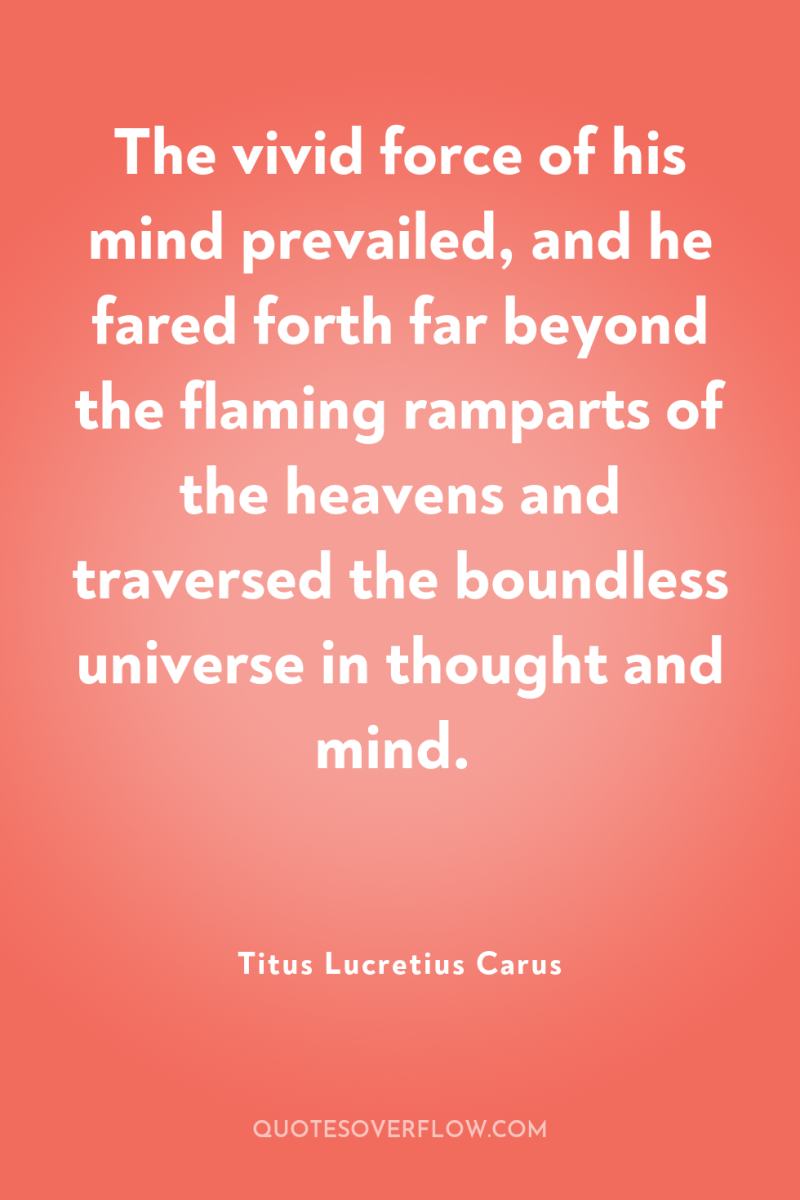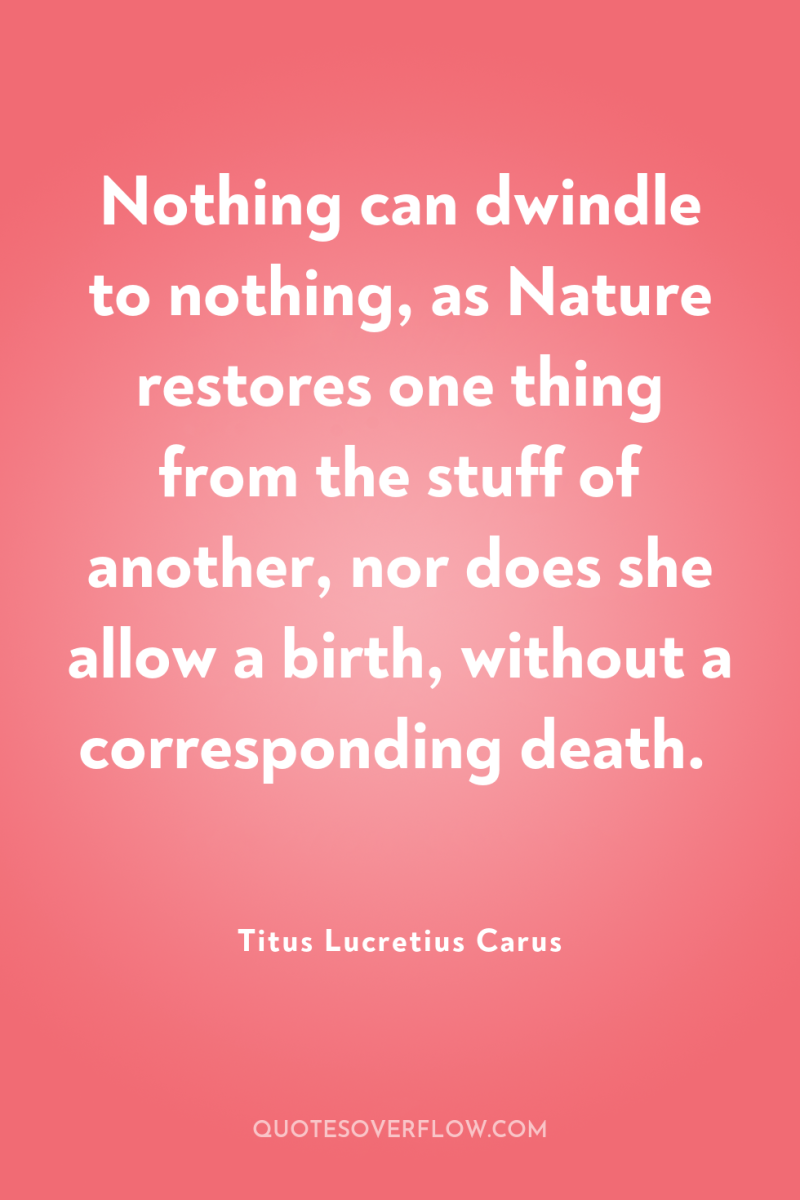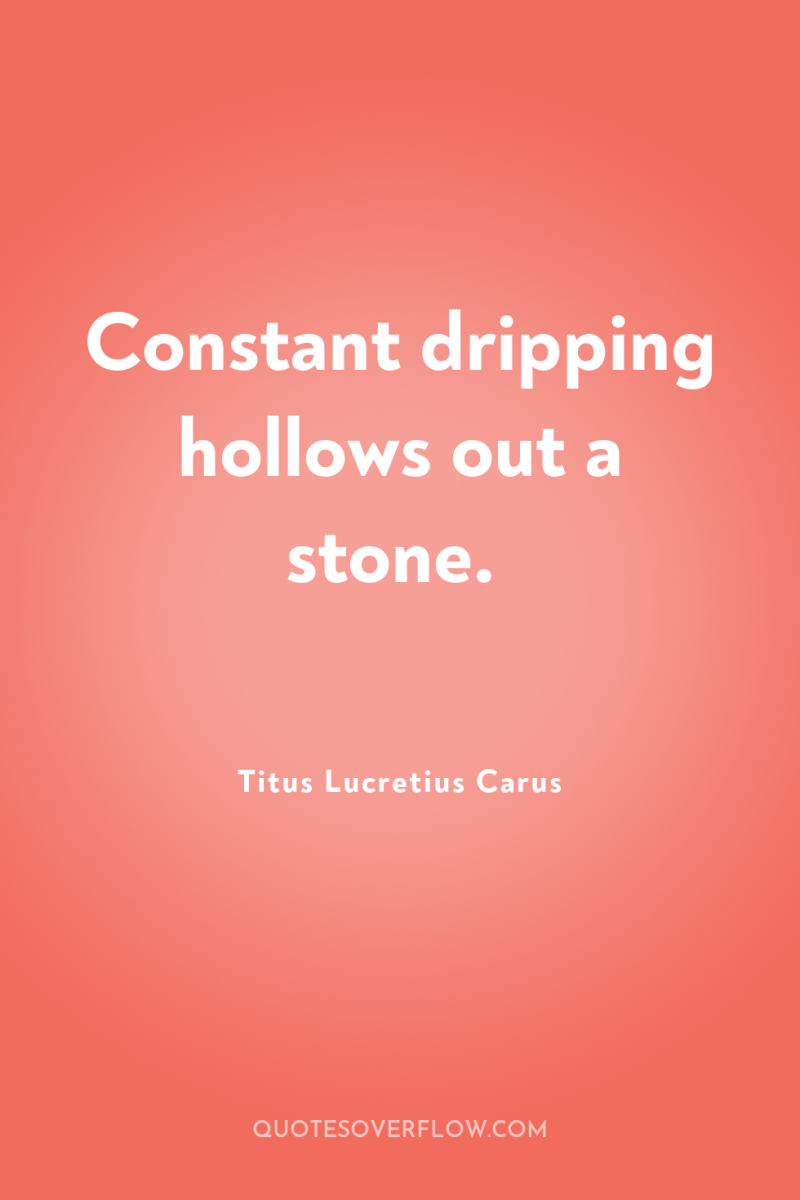1
A man leaves his great house because he's bored With life at home, and suddenly returns, Finding himself no happier abroad. He rushes off to his villa driving like mad, You'ld think he's going to a house on fire, And yawns before he's put his foot inside, Or falls asleep and seeks oblivion, Or even rushes back to town again. So each man flies from himself (vain hope, because It clings to him the more closely against his will) And hates himself because he is sick in mind And does not know the cause of his disease.Titus Lucretius Carus

2
What is food to one man is bitter poison to othersTitus Lucretius Carus
3
The supply of matter in the universe was never more tightly packed than it is now, or more widely spread out. For nothing is ever added to it or subtracted from it. It follows that the movement of atoms today is no different from what it was in bygone ages and always will be. So the things that have regularly come into being will continue to come into being in the same manner; they will be and grow and flourish so far as each is allowed by the laws of nature. .Titus Lucretius Carus

4
The vivid force of his mind prevailed, and he fared forth far beyond the flaming ramparts of the heavens and traversed the boundless universe in thought and mind.Titus Lucretius Carus
5
Visible objects therefore do not perish utterly, since nature repairs one thing from another and allows nothing to be born without the aid of another's death.Titus Lucretius Carus
6
Furthermore, as the body suffers the horrors of disease and the pangs of pain, so we see the mind stabbed with anguish, grief and fear. What more natural than that it should likewise have a share in death?Titus Lucretius Carus
7
So it is more useful to watch a man in times of peril, and in adversity to discern what kind of man he is; for then at last words of truth are drawn from the depths of his heart, and the mask is torn off, reality remains.Titus Lucretius Carus

8
Nothing can dwindle to nothing, as Nature restores one thing from the stuff of another, nor does she allow a birth, without a corresponding death.Titus Lucretius Carus

9
All religions are equally sublime to the ignorant, useful to the politician, and ridiculous to the philosopher.Titus Lucretius Carus
10
The whole of life but labours in the dark. For just as children tremble and fear all In the viewless dark, so even we at times Dread in the light so many things that be No whit more fearsome than what children feign, Shuddering, will be upon them in the dark. This terror then, this darkness of the mind, Not sunrise with its flaring spokes of light, Nor glittering arrows of morning can disperse, But only nature's aspect and her law.Titus Lucretius Carus
11
Fear in sooth holds so in check all mortals, becasue thay see many operations go on in earth and heaven, the causes of which they can in no way understand, believing them therefore to be done by power divine. for these reasons when we shall have seen that nothing can be produced from nothing, we shall then more correctly ascertain that which we are seeking, both the elements out of which every thing can be produced and the manner in which every thing can be produced in which all things are done without the hands of the gods.Titus Lucretius Carus

12
Constant dripping hollows out a stone.Titus Lucretius Carus
13
This terror then and drakness of mind must be dispelled not by the rays of the sun and glittering shafts of day, but by the aspect and the law of nature; the warp whose design we shall begin with this first principle, nothing is ever gotten out of nothing by divine power.Titus Lucretius Carus
14
There is no murky pit of hell awaiting anyone ... Mind cannot arise alone without body, or apart from sinews and blood ... You must admit, therefore, that when then body has perished, there is an end also of the spirit diffused through it. It is surely crazy to couple a mortal object with an eternal...Titus Lucretius Carus
15
Fear in sooth holds so in check all mortals, because they see many operations go on in earth and heaven, the causes of which they can in no way understand, believing them therefore to be done by power divine.Titus Lucretius Carus
16
Burning fevers flee no swifter from your body if you toss under figured counterpanes and coverlets of crimson than if you must lie in rude homespun.Titus Lucretius Carus
17
We, peopling the void air, make gods to whom we impute the ills we ought to bear.Titus Lucretius Carus
18
Mortal, what hast thou of such grave concern That thou indulgest in too sickly plaints? Why this bemoaning and beweeping death? For if thy life aforetime and behind To thee was grateful, and not all thy good Was heaped as in sieve to flow away And perish unavailingly, why not, Even like a banqueter, depart the hall, Laden with life?Titus Lucretius Carus
19
There can be no centrein infinity.Titus Lucretius Carus
20
That also which before was from the earth, passes back into the earth, and that which was sent from the borders of ether, is carried back and taken in again by the quarters of heaven. Death does not extinguish things in such a way as to destroy the bodies of matter, but only breaks up the union amongst them, and then joins anew the different elements with others; and thus it comes to pass that all things change their shapes and alter their colors and receive sensations and in a moment yield them up..Titus Lucretius Carus